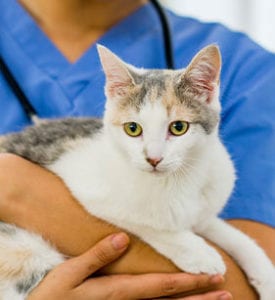Cats make amazing pets, and they have found their way into people’s hearts all over the world. There are some things that you need to do before and after you bring your new best friend home. New cat owners are likely wondering: what do I need before I bring my new cat home? Let us tell you the cat facts.
Before you bring home your cat you will need some supplies, and you will also need to know what the recommended exams and disease prevention measures are for your new pet.
In this article, we will be providing you with a list of essentials when it comes to properly caring for your cat. This includes supplies and recommended routine vet care. We will also be giving you some extra cat care tips that are sure to help any new cat owner. Here are some tips on how to properly care for your cat.
What Cat Items Do You Need to Have Before You Bring Your Cat Home?
Before we even talk about the recommended routine vet care, there are some essential supplies that you will need before bringing home your first cat. Here is a list of supplies that you will need before your cat arrives at your house.
- Cat litter and a litter box
- Food and water bowls
- Cat food
- A brush, nail clippers, and a cat toothbrush for grooming
- A cat bed
- A scratching post and a place for them to climb (ex: a cat tree)
- Plenty of different toys
After purchasing the above essentials and your new kitty is settled at home, don’t forget to contact us for their wellness visit. You can do this before you bring your cat home or soon after. In addition, you may also want to cat proof your home before you adopt your new cat to ensure their safety as well.
Cat Exams That Are Recommended by Vets
There are some examinations and tests that your vet will likely recommend during your cat’s first exam. However, these recommendations and procedures can differ depending on your cat’s age. Here are all of the common procedures and tests that are often recommended by vets.
Exams Recommended for Kittens
Kittens may need a few extra tests than adult cats do, and your new kitten will likely need the following things during their first vet visit.
- Their first vaccines
- A fecal exam
- Blood tests
- A physical exam (the vet is looking for signs of illness, genetic and physical abnormalities, and any signs of a parasitic infection)
In addition to the above procedures, your vet may also put your cat on preventative medication for heartworm, fleas, and ticks. They may also talk to you about spaying or neutering if your cat hasn’t been already.
Exams Recommended for Healthy Adult Cats
Healthy adult cats usually do not need quite as many tests as kittens and senior cats do. However, this does not mean that these cats do not need an annual exam. An annual exam for a healthy adult cat usually includes:
- Getting booster shots
- A physical exam (the vet is looking for signs of illness, genetic and physical abnormalities, and any signs of a parasitic infection)
- A fecal exam (especially recommended for cats that spend time outside)
- Routine blood tests
Your vet may also screen for some infectious diseases such as FIV/FELV. This is especially true for cats that may have been at risk for contracting an infectious disease. Usually adopted adult cats have been spayed or neutered, but your vet may suggest this if they haven’t been.
Exams Recommended for Senior Cats
Elderly cats are more at risk for contracting certain diseases and having other medical concerns than healthy younger adult cats. As a result, an older cat will likely need some more tests done, especially if they are showing signs of having an illness or health condition. In addition, senior cats may need more frequent vet visits than young cats do. Here are the common exams and tests given in a vet visit for an elderly cat.
- Blood and urine tests (usually more involved than kittens and healthy, younger adult cats)
- A physical exam (the vet is looking for signs of illness, genetic and physical abnormalities, and any signs of a parasitic infection)
- A routine fecal exam
- Booster shots (only when needed)
Due to cats commonly developing age related conditions later in life, you will likely need to screen for specific medical conditions and treat them if they develop. As a result, vet visits are crucial, especially if your cat is in their senior years.
 What Shots Does Your Cat Need?
What Shots Does Your Cat Need?
Although many rescues and shelters keep up to date on their animals’ shots, there may be times that you will need to get your cat or kitten their very first set of shots. In addition to this, cats need boosters for many of their shots. Here is a list of the recommended vaccinations that your cat should have.
- Rabies vaccine
- Feline Viral Rhinotracheitis (FVR) Vaccine
- Feline Distemper Vaccine
- Feline Calicivirus (FCV) vaccine
- Feline Leukemia Virus (FelV) vaccine
- Chlamydophila Felis vaccine
These vaccines should be given at different stages in a cat’s life, and the frequency of booster shots may differ depending on your cat’s health and risk factors. As a result, you should always follow your vet’s advice when it comes to vaccinating your pet.
Other Elements to Caring for Your Cat
There are some other things that you should do when it comes to caring for your cat properly. These include:
- Feeding your cat a balanced diet
- Always provide clean fresh water for your cat
- Groom your cat when needed (includes brushing, nail trims, and keeping your cat’s ears and teeth clean)
- Give them enough exercise and mental stimulation
- Give your cat preventative medication to keep your cat flea, tick, and heartworm free
Are Your Ready for Your New Cat?
Having a cat as a pet is exciting, and it is a great experience for many people. To keep your pet healthy, there are some essential things that you need to do for them as their owner. This includes having all of the essential supplies for your cat, taking your cat to the vet when recommended, and more. We’re here when it’s time for their vet visits!


 What Shots Does Your Cat Need?
What Shots Does Your Cat Need?